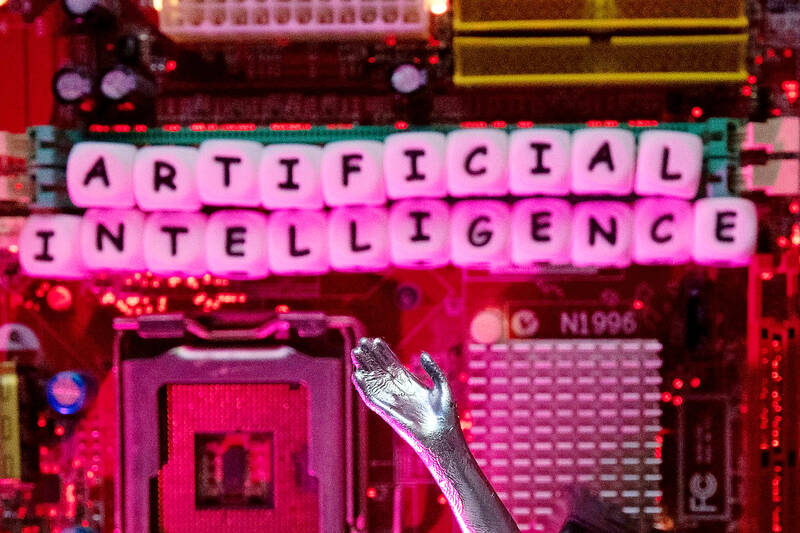Chinese researchers are exploring ways to use artificial intelligence (AI) tools such as ChatGPT to manipulate global audiences, possibly including their perceptions of Taiwan, a RAND Corp study found.
The US-based think tank published the report The Rise of Generative AI and the Coming Era of Social Media Manipulation 3.0 on Thursday last week discussing potential threats to US national security posed by actors misusing generative AI technologies, with a focus on China.
Although no evidence has shown that Beijing is using AI to generate and publish content on social media, it is the consensus among independent researchers and a number of governments that the Chinese government is conducting social media manipulation, the report said.

Photo: Reuters
“AI offers the CCP [Chinese Communist Party] the potential to fulfill longstanding desires to shape the global conversation about itself and China more broadly,” the report said.
It cited studies that pointed to Beijing’s attempt to interfere in Taiwan’s 2018 presidential election through social media manipulation.
New tactics emerged afterward, including using content farms to produce numerous false or misleading content, buying established Taiwanese social media accounts and allegedly paying Taiwanese influencers to spread pro-Beijing narratives, it said.
These efforts might not have a significant influence on election results, but seem to be “worsening Taiwanese political and social polarization and widening perceived generational divides,” it said.
Utilizing AI might further improve the authenticity of China-produced content, as well as reduce the money and the labor required to produce it, meaning it could reach further and wider, the report said.
With China’s technology ecosystem and strong government support, at least 30 Chinese companies, universities and research institutions were developing generative AI models as of April, it said.
By growing its technical capability in developing large language models, on which OpenAI’s ChatGPT is based, trained mainly on Chinese-language data, the Chinese government might acquire sufficient capability to conduct social media manipulation on both domestic and foreign scales, the report said.
Beijing’s efforts to shape foreign public opinion can be found on more than social media platforms, they also include print, radio and television, it said, adding that “using generative AI for such content at scale would be a natural progression of CCP efforts.”
Nathan Beauchamp-Mustafaga, one of the authors of the report, told Defense One on Thursday last week that “logically the next target for China would be the Taiwanese [2024 presidential] election” in terms of manipulating public opinion.
The Web site said that social media platforms “aren’t well positioned to guard against” China’s efforts to conduct large-scale manipulation using generative AI.

A car bomb killed a senior Russian general in southern Moscow yesterday morning, the latest high-profile army figure to be blown up in a blast that came just hours after Russian and Ukrainian delegates held separate talks in Miami on a plan to end the war. Kyiv has not commented on the incident, but Russian investigators said they were probing whether the blast was “linked” to “Ukrainian special forces.” The attack was similar to other assassinations of generals and pro-war figures that have either been claimed, or are widely believed to have been orchestrated, by Ukraine. Russian Lieutenant General Fanil Sarvarov, 56, head

SAFETY FIRST: Double the number of police were deployed at the Taipei Marathon, while other cities released plans to bolster public event safety Authorities across Taiwan have stepped up security measures ahead of Christmas and New Year events, following a knife and smoke bomb attack in Taipei on Friday that left four people dead and 11 injured. In a bid to prevent potential copycat incidents, police deployments have been expanded for large gatherings, transport hubs, and other crowded public spaces, according to official statements from police and city authorities. Taipei Mayor Chiang Wan-an (蔣萬安) said the city has “comprehensively raised security readiness” in crowded areas, increased police deployments with armed officers, and intensified patrols during weekends and nighttime hours. For large-scale events, security checkpoints and explosives

PUBLIC SAFETY: The premier said that security would be tightened in transport hubs, while President Lai commended the public for their bravery The government is to deploy more police, including rapid response units, in crowded public areas to ensure a swift response to any threats, President William Lai (賴清德) said yesterday after a knife attack killed three people and injured 11 in Taipei the previous day. Lai made the remarks following a briefing by the National Police Agency on the progress of the investigation, saying that the attack underscored the importance of cooperation in public security between the central and local governments. The attack unfolded in the early evening on Friday around Taipei Main Station’s M7 exit and later near the Taipei MRT’s Zhongshan

REBUFFED: In response to Chinese criticism over recent arms sales, Washington urged Beijing to engage in meaningful dialogue instead of threats and intimidation Washington’s long-term commitment to Taiwan would not change, the US Department of State said yesterday, urging Beijing to stop pressuring Taiwan and engage in meaningful bilateral dialogues. The remarks came in response to a backlash from Beijing about Washington’s latest approval of arms sales to Taiwan. The US Defense Security Cooperation Agency said in a statement on Wednesday that the Taipei Economic and Cultural Representative Office in the US has asked to purchase an arms package, including Tactical Mission Network Software; AH-1W helicopter spare and repair parts; M109A7 self-propelled howitzers; HIMARS long range precision strike systems; tube-launched, optically tracked, wire-guided missiles; Javelin